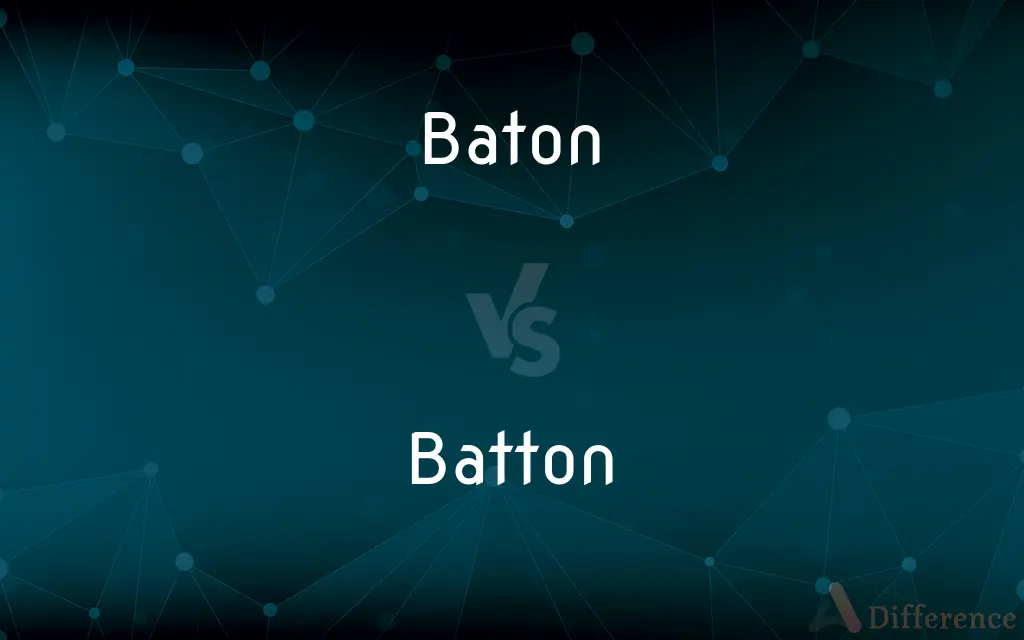Baton vs. Batton — What's the Difference?
By Tayyaba Rehman — Updated on October 6, 2023
A Baton is a thin stick used in directing music or relay races, while Batton is a less common spelling variant of "batten," a structural piece of lumber. Both have distinct purposes.

Difference Between Baton and Batton
Table of Contents
ADVERTISEMENT
Key Differences
Baton typically refers to a thin rod used in various contexts, such as in music, where a conductor wields it to direct an orchestra. It's a symbol of authority and guidance, ensuring harmony in musical performance. Batton, on the other hand, is less commonly encountered in American English, but when it is, it usually refers to "batten," meaning a long, flat piece of lumber used in carpentry or construction.
In relay races, Baton refers to the rod passed between runners. It's a symbol of continuation and teamwork, vital for the transition between racers. Batton, when referring to the piece of lumber, can be a structural or reinforcing element in building projects, ensuring stability and strength.
Baton can also denote rank or authority in police or military contexts. In this sense, it represents order, discipline, and command. Batton, given its construction implications, might be used to secure or reinforce structures, highlighting the practical application in carpentry or shipbuilding.
From a linguistic perspective, Baton is widely recognized and accepted as the correct spelling for the contexts mentioned. Batton, as a variant of "batten," can sometimes be seen as a misspelling, especially if the intended meaning relates to the wood piece.
Lastly, while Baton finds varied applications—from music to sports to law enforcement—Batton's use remains relatively niche, specific to certain construction or carpentry contexts, often as a synonym for "batten."
ADVERTISEMENT
Comparison Chart
Primary Use
Directing music, relay races, symbol of rank.
Less common variant of "batten" in construction.
Symbolizes
Authority, guidance, or continuation.
Reinforcement or structure in carpentry.
Contexts
Music, sports, law enforcement.
Construction, carpentry.
Acceptance
Widely recognized spelling.
Sometimes seen as a misspelling of "batten."
Material
Typically lightweight materials.
Typically lumber or wood.
Compare with Definitions
Baton
Symbol of authority in policing.
The officer held his baton, ready to maintain order.
Batton
A strip of lumber for reinforcement.
The batton provided additional support to the structure.
Baton
A conductor's tool for directing music.
The conductor raised his baton and the orchestra began to play.
Batton
Used in shipbuilding.
The ship's design required several battons for stability.
Baton
Represents rank in some organizations.
The baton on his shoulder denoted his high rank.
Batton
Variant of "batten" used in carpentry.
The craftsman placed the batton carefully on the door.
Baton
A rod in relay races.
She passed the baton to the next runner seamlessly.
Batton
Sometimes a misspelled term.
He realized he had written batton instead of batten in his report.
Baton
A twirling rod for performances.
She skillfully twirled her baton during the halftime show.
Batton
Can be decorative in some architectural contexts.
The battons gave a rustic appearance to the facade.
Baton
(Music) A slender wooden stick or rod used by a conductor to direct an orchestra, band, or other musical group.
Batton
Batton is an English and French (IPA: [batɔ̃]) surname with several proposed etymologies. In English it may be a diminutive form of Batt – itself derived from the Middle English Batte, a pet form of Bartholomew – and in French a variant of Baston.
Baton
A hollow metal rod with a heavy rubber tip or tips that is wielded and twirled by a drum major or drum majorette.
Batton
Archaic form of batten
Baton
A short staff carried by certain public officials as a symbol of office.
Batton
Archaic form of baton
Baton
(Sports) The hollow cylinder that is carried by each member of a relay team in a running race and passed to the next team member.
Batton
See Batten, and Baton.
Baton
A short stick carried by police; a billy club.
Baton
(Heraldry) A shortened narrow bend, often signifying bastardy.
Baton
A staff or truncheon, used for various purposes.
A field marshal's baton
Baton
(music) The stick of a conductor in musical performances.
Baton
(sports) An object transferred by runners in a relay race.
Baton
(US) A short stout club used primarily by policemen; a truncheon UK.
Baton
(heraldry) A bend with the ends cut off, resembling a baton, typically borne sinister, and often used as a mark of cadency, initially for both legitimate and illegitimate children, but later chiefly for illegitimate children.
Baton
A short vertical lightweight post, not set into the ground, used to separate wires in a fence.
Baton
To strike with a baton.
Baton
A staff or truncheon, used for various purposes; as, the baton of a field marshal; the baton of a conductor in musical performances.
He held the baton of command.
Baton
An ordinary with its ends cut off, borne sinister as a mark of bastardy, and containing one fourth in breadth of the bend sinister; - called also bastard bar. See Bend sinister.
Baton
A thin tapered rod used by a conductor to direct an orchestra
Baton
An implement passed from runner to runner in a relay race
Common Curiosities
Variant of "batten" used in carpentry.
The craftsman placed the batton carefully on the door.
Used in shipbuilding.
The ship's design required several battons for stability.
A strip of lumber for reinforcement.
The batton provided additional support to the structure.
Sometimes a misspelled term.
He realized he had written "batton" instead of "batten" in his report.
Can be decorative in some architectural contexts.
The battons gave a rustic appearance to the facade.
Are Batons used in any sports?
Yes, batons are used in relay races where they're passed between runners.
Is Batton a misspelled term?
Batton can be seen as a misspelling of "batten," especially in construction contexts.
What's the primary material for a musical Baton?
Musical batons are typically made of lightweight materials like wood or fiberglass.
Can Baton be a weapon?
Yes, batons are sometimes used by police as a non-lethal weapon for self-defense and control.
Are there any ceremonial uses for Batons?
Yes, batons can symbolize rank or authority in certain military or organizational ceremonies.
What is a Baton used for in music?
In music, a baton is used by conductors to direct an orchestra or band.
Is Batton a common term in construction?
Batton is a less common variant of "batten," which refers to a structural piece of lumber.
What's the main material of a Batton in carpentry?
In carpentry, a batton is typically made of lumber or wood.
Can Battons be decorative?
Yes, battons (or battens) can have decorative purposes in architecture or design.
What's the primary difference between Baton and Batton?
Baton typically refers to a rod used in music or sports, while Batton is often a variant of "batten" related to carpentry.
How are Battons used in shipbuilding?
In shipbuilding, battons (or battens) can reinforce or shape the structure of a ship.
Do all conductors use Batons?
Not all, but many conductors use batons to direct orchestras or bands.
Are Battons always straight pieces?
Typically, battons (or battens) are straight, but their shape can vary based on the specific application.
Is the Baton in relay races heavy?
No, the baton used in relay races is lightweight for easy passing between runners.
Can Baton and Batton be used interchangeably?
No, they refer to different items and have distinct applications.
Share Your Discovery

Previous Comparison
Completely vs. Thoroughly
Next Comparison
Language vs. LingoAuthor Spotlight
Written by
Tayyaba RehmanTayyaba Rehman is a distinguished writer, currently serving as a primary contributor to askdifference.com. As a researcher in semantics and etymology, Tayyaba's passion for the complexity of languages and their distinctions has found a perfect home on the platform. Tayyaba delves into the intricacies of language, distinguishing between commonly confused words and phrases, thereby providing clarity for readers worldwide.














































